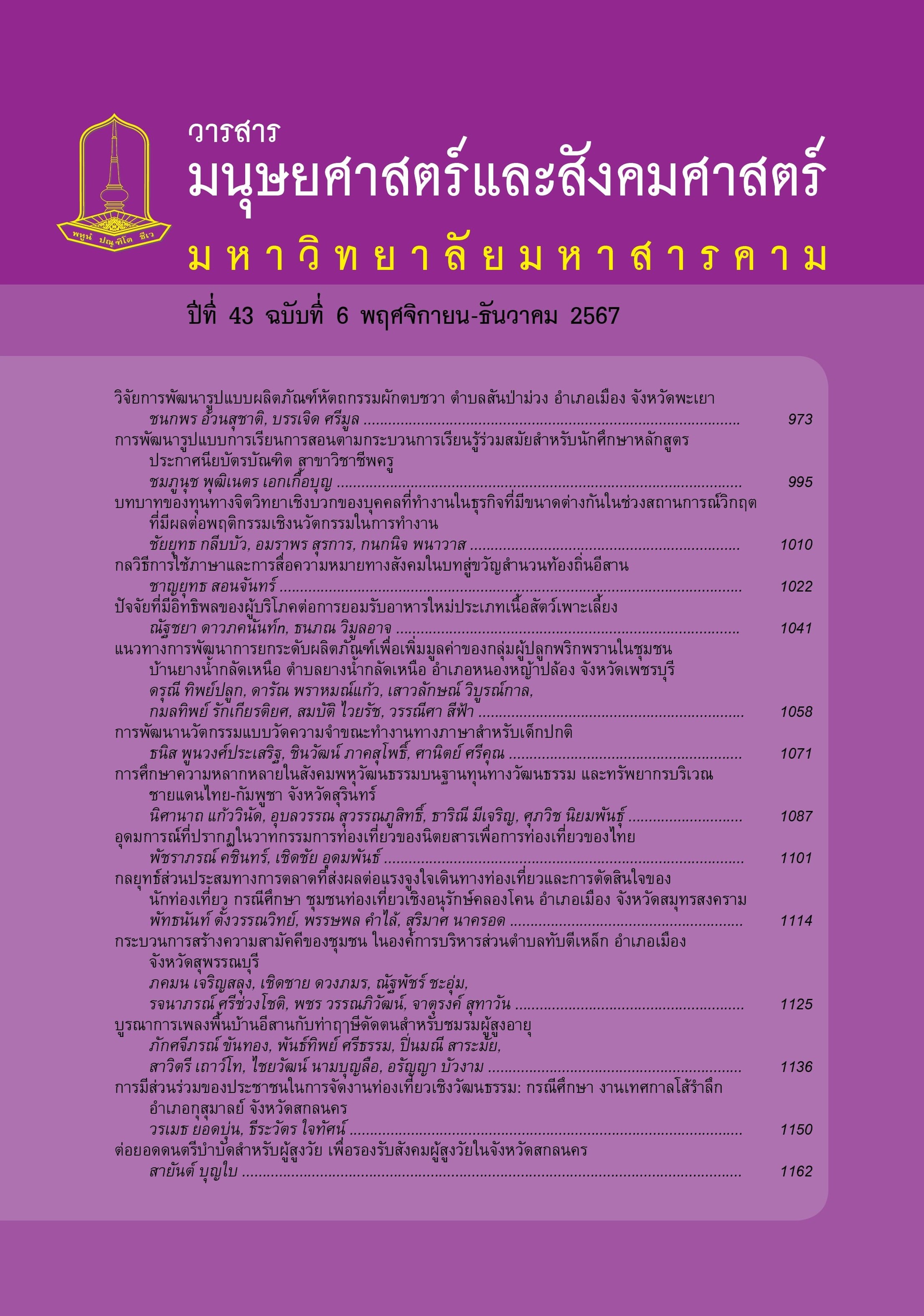ปัจจัยที่มีอิทธิพลของผู้บริโภคต่อการยอมรับอาหารใหม่ประเภทเนื้อสัตว์เพาะเลี้ยง
Main Article Content
บทคัดย่อ
ปีขึ้นไป ที่อาศัยในมหาวิทยาลัยขอนแก่น จังหวัดขอนแก่น จำนวน 400 คน ใช้แบบสอบถามเป็นเครื่องมือในงานวิจัยโดยสถิติที่ใช้ในการวิเคราะห์ข้อมูล คือ สถิติเชิงพรรณนา ได้แก่ ความถี่ ร้อยละ ค่าเฉลี่ย ค่าเบี่ยงเบนมาตรฐาน และ สถิติเชิงอนุมานโดยวิเคราะห์การถดถอยพหุคูณ ผลการวิจับพบว่า พฤติกรรมตามแผน ด้านทัศนคติต่อการบริโภคมีระดับความคิดเห็นสูงสุด(
Article Details
เอกสารอ้างอิง
กัลยา วานิชย์บัญชา. (2551). การวิเคราะห์สถิติ: สถิติสำหรับการบริหารและการวิจัย พิมพ์ครั้งที่ 11. กรุงเทพฯ: โรงพิมพ์แห่งจุฬาลงกรณ์มหาวิทยาลัย.
กัลยา วานิชย์บัญชา และฐิตา วานิชย์บัญชา. (2561). การใช้ SPSS for Windows ในการวิเคราะห์ข้อมูล. พิมพ์
ครั้งที่ 31. กรุงเทพฯ: สามลดา.
ณัฐชยา ดวงจรัส. (2567). Novel food ที่วางจำหน่ายได้ในตลาดยุโรปตามระเบียบอาหารใหม่. Food focus Thailand. (1973). 6(7) 29.
ณัฐณภัทร์ อภิมาศยานนท์. (2564). ส่วนประสมทางการตลาดและพฤติกรรมตามแผนที่มีผลต่อการตัดสินใจซื้อ นมเวย์โปรตีนของผู้บริโภคในเขตกรุงเทพมหานคร. 1(2):
https://mmm.ru.ac.th/MMM/IS/twin92/6214154646.pdf
วรัญญา เตชะสุขถาวร. (2566). ความยั่งยืนและความมั่นคงทางอาหาร. Food focus Thailand. (1973). 5(6) 34.
สำนักงานบริหารและพัฒนาองค์ความรู้. (2558). Urbanization การขยายตัวของความเป็นเมือง. 2(1): https://www.okmd.or.th/okmd-opportunity/urbanization/256
สำนักงานคณะกรรมการอาหารและยา. (2566). อาหารใหม่. กฎหมายอาหาร. 1(1). จาก
https://food.fda.moph.go.th/food-law/f-na-novel-food
Ajzen, I. (1991). The Theory of Planned Behavior, Organizational Behavior and Human Decision Processes, 50(2), 179-211.
Ben-Arye, T., Shandalov, Y., Ben-Shaul, S., Landau, S., Zagury, Y., Ianovici, I., ... & Levenberg, S. (2020). Textured soy protein scaffolds enable the generation of three-dimensional bovine skeletal muscle tissue for cell-based meat. Nature Food, 1(4), 210-220.
Black, K. (2016). Business Statistics: For Contemporary Decision Making. 9th ed. John Wiley & Sons.
Chai, L. X. (2023). Intention to consume cultured meatballs among the youths in Malaysia, a behavioural
study (Doctoral dissertation, UTAR). http://eprints.utar.edu.my/5558/1/MBA_2023_CLX.pdf
Cochran, W.G. (1977). Sampling Techniques. 3d ed. New York: John Wiley and Sons Inc.
Datar, I., & Betti, M. (2010). Possibilities for an in vitro meat production system. Innovative Food Science & Emerging Technologies, 11, 13–22. https://doi.org/10.1016/j.ifset.2009.10.007
Dupont, J., Harms, T., & Fiebelkorn, F. (2022). Acceptance of cultured meat in Germany—Application of
an extended theory of planned behaviour. Foods, 11(3), 424.
Farid, M. S., Cavicchi, A., Rahman, M. M., Barua, S., Ethen, D. Z., Happy, F. A., Rasheduzzaman, Md., Sharma, D., & Alam, M. J. (2023). Assessment of marketing mix associated with consumer's purchase intention of dairy products in Bangladesh: Application of an extended theory of planned behavior. Heliyon, 9(6).
Goodland, R., & Anhang, J. (2009). What if the key actors in climate change are… cows, pigs and chickens. World Watch Magazine.
Hair, J.F., Black, W.C., Babin, B.J., & Anderson, R.E. (2019). Multivariate data analysis. 8th ed. Hampshire: Cengage Learning.
Hocquette, J. F. (2016). Is in vitro meat the solution for the future? Meat science, 120, 167–176. https://doi.org/10.1016/j.meatsci.2016.04.036
Jarad, G. (2020). Application of the 4Cs marketing mix in the digital environment. International Journal of Psychosocial Rehabilitation, 24(10), 2113-2122.
Kotler, P. (1997). Marketing Management: Analysis, Planning, Implementation and Control. 14th Global ed. Upper Saddle River, NJ: Prentice-Hall.
Lauterborn, B. (1990). New Marketing litany; Four Ps passe; C-words take over. Advertising Age, 61(41), 26.
Lesser, J. G., and Pope, D. S. (2011). Human behavior and the social environment: theory and Practice. 2'' ed. Boston: Allyn and Bacon.
PricewaterhouseCoopers Business Services Srl. (2022). The Novel Food Market. Retrieved from pwc: https://www.pwc.com/it/it/publications/assets/docs/pwc-the-novel-food-market.pdf
Seehafer, A., Bartels, M., 2019. Meat 2.0–the regulatory environment of plant-based and cultured meat.
Eur. Food Feed. Law Rev. 14 (4), 323–331. https://www.jstor.org/stable/26775798.
United Nations. (2024, February 13). World Population Prospects 2022.


